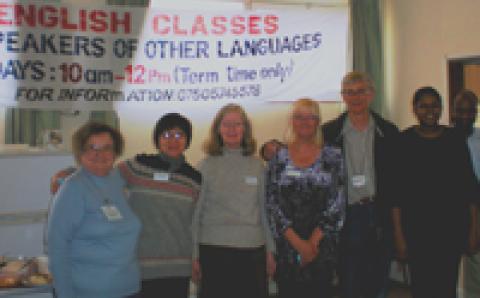When Gail Rice’s brother was murdered in 1997, she had no idea her journey would lead her to become an advocate against the death penalty. This past March, Rice witnessed the abolishment of the death penalty in Illinois.
On Nov. 12, 1997, Rice’s brother Bruce VanderJagt, a police officer, was shot during a botched burglary attempt in Denver. The gunman then took VanderJagt’s service revolver and killed himself.
Gail Rice holds a photo of her brother, Bruce VanderJagt, who was murdered in 1997.
At the time of VanderJagt’s murder, Rice had already spent 18 years working with criminals, tutoring them weekly in Chicago’s Cook County Jail and ministering to them with Prison Fellowship Ministries. She had long been interested in corrections and passionate about adult literacy.
“My experience in correctional institutions initially made me oppose the death penalty,” said Rice, “because I saw a very different standard of justice for the rich and for the poor, and I believed the death penalty would always be applied unfairly to the poor and minorities.”
After VanderJagt’s death, Rice became involved with support groups, one being Murder Victims’ Families for Reconciliation. She became an outspoken voice, on behalf of murder victims, against the death penalty, speaking in Illinois’ state capitol to a commission on the death penalty.
“I don’t experience any contradiction at all in being involved in both [prison ministry and death penalty abolishment advocacy],” Rice said. “It has to do with the idea that we’re all loved by God and valued by God and created in the image of God.”
Rice, a member of Hope Christian Reformed Church, Oak Forest, Ill., continues to speak on restorative justice and advocate against the death penalty. She acknowledges, however, that the death penalty does divide families. Her stance has created distance between her and VanderJagt’s widow and daughter.
About the Author
Melissa Holtrop








